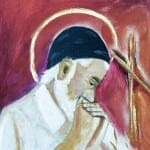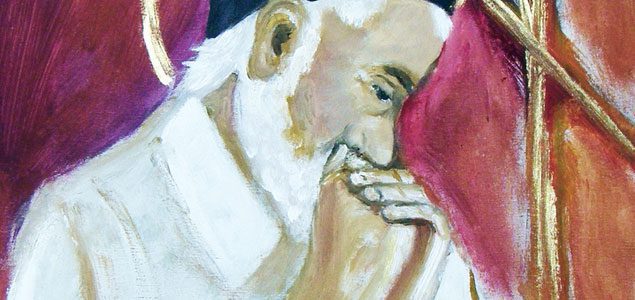 Vincentians as mystics??? For many followers of Vincent and Louise putting together Vincentian and mystic seems very strange.
Vincentians as mystics??? For many followers of Vincent and Louise putting together Vincentian and mystic seems very strange.
The followers of Vincent and Louise take a bit of holy pride in being practical, down to earth people. We are hands on people or in the language of Pope Francis we tend tend to have the smell of our sheep.
But the reality of the Vincentian charism is perhaps much deeper than that and the subject for this Saturday’s Study Hall based on documents found in the Vincentian Encyclopedia.
1. Sr. Gertrude Foley, SC writes, “I think that we trivialize our charism and tradition, if we limit it to mean only works of service….the grounding insight of our founders was mystical, powerful and empowering. This was the insight that answered their questions, allayed their doubts, and strengthened them when the testing came.”
“Unless we are as passionate as our founders were to grow daily into this identification with Jesus and his mission, we cannot claim the name Vincentian. We can exhaust ourselves in implementing our strategies to serve the poor. But as Vincentians we will fail, if we do not contextualize all of our service in the three-way identification seen so clearly by our founders: the trinitarian relationship, if you will, among Jesus, the poor person, and the servant of the poor, We take certain pride (holy, I hope) in the practical, down-to-earth quality of our charism and tradition. That is true enough. Nevertheless, the grounding insight of our founders was mystical, powerful and empowering. This was the insight that answered their questions, allayed their doubts, and strengthened them when the testing came.”
Visit the Vincentian Encyclopedia for the full presentation of this 1997 presentation to the Vincentian Family at St. John’s University.
See also two recently translated article on Vincentian mysticism found in the Vincentian Encyclopedia.
2. The Source of the Mysticism of the Vincentian Tradition – Jesús Miguel Hurtado Salzar, CM
“From the time of the Patristic era (Saint Augustine and Saint John Chrysostom) [1] to the present time, but especially during the modern era, various charitable organizations have based their action and their mysticism on the Lord’s simple proclamation: whatever you did for me of these least brother or sisters of mine, you did for me (Matthew 25:40). Those groups that are identified with the Vincentian charism stand out in this regard…..
“We shall attempt to engage in a reflective reading … indeed, this is a time to tell the story and to know the content of the text. Thus we will draw closer to the text, taking time to understand it. We will then allow ourselves some time to be guided and led by this text and some more time to listen from a Vincentian perspective to the prophetic word that the text contains. Lastly, we shall take some time to conclude, that is, we will attempt to confront the future with confidence.
3. St. Louise, a mystic – Benito Martínez Betanzos, CM
Against a background of the gospel account of the Transfiguration on the Second Sunday of Lent (Mk 9:2-10), this Reflection by Tim Williams CM looks at Louise’s “Lumiere” expereince and draws on quotations from an article by Benito Martinez Betanzos CM titled Saint Louise de Marillac, a mystic to show that religious experiences were a part of Louise’s life, though not in a strong a fashion as her “Lumiere”. Father Williams is Provincial Director of the Daughters of Charity in Australia.
For a contemporary down to earth description of mysticism today by a Benedictine, Br. David Steindl-Rast visit Mysticism as the Frontier of Consciousness Evolution
“The mystics are not a special kind of human being. But every human being is a special kind of mystic. The challenge for you is to discover as soon as possible what particular kind of mystic you are. Find where your own mystical experience lies and explore that. …Our mystic experience is the point where we are all one. And it is at the same time the measure, the standard for what is real. Therefore, it is only on this basis that we can ever agree on what is true or real. Mystic awareness is the deepest anchor for human solidarity. But more of this later.”…
“Mysticism in the broadest sense is “the experience of communion with Ultimate Reality.”
“Each of these three points is important. It is an experience. Mysticism is not theory but practical experience–your own. And it is a special kind of experience, namely, an experience of communion. That communion aspect is very important. What stands in the foreground of your particular experience may be communion in a limited sense. You may experience deep communion by sharing with one other person or with an animal, with a pet. You may be focusing, for example, on a moment when you lost your pet and found it again. That may be one of those mystical moments. But this kind of experience always implies a greater communion, it always implies a communion that has no limits. That is why we speak of communion with Ultimate Reality.”
Tags: Featured, Louise de Marillac, Saturday Study Hall, Steindl-Rast, Vincent, Vincentians


This resource is a MUST READ for all of us in the Family!
Thank you for this beautiful article. I will pass it around for others to read and study.